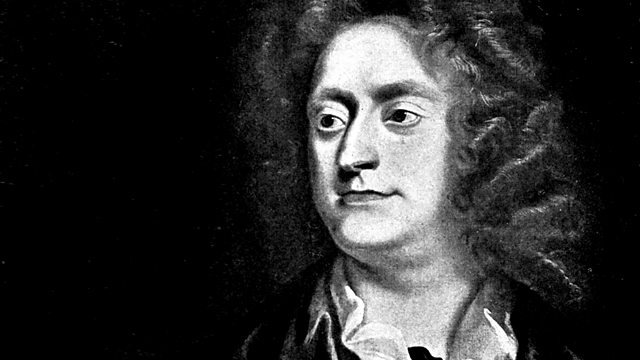
The Blockbuster
Donald Macleod follows Purcell's progress at the creative heart of London's theatrical life, when his setting of A Midsummer Night's Dream was staged by the United Company.
Purcell's stageworks: "The Fairy Queen", Purcell's most lavish production, enchants audiences but its exorbitant cost has disastrous consequences for the United Company.
Across the week Donald Macleod charts Purcell's activities during the reign of William and Mary. Cutbacks at court meant fewer commissions, but even though Purcell was asked to write less church music, he was able to cater admirably to the Royal taste for music for special occasions and write prolifically for the theatre.
Walk along the North Quire Aisle of Westminster Abbey and you'll come to the tablet commemorating Henry Purcell. One of the pre-eminent musicians of the age, he died, unexpectedly and tragically early in 1695 at the age of 37. Yet despite the brevity of his life, Purcell left behind a rich musical legacy. Indeed, with little in the way of biographical detail remaining, it's through his music that glimpses of his character emerge. He was a gifted and prolific composer who wrote with skill and imagination for the opera, the church, theatre, royal patrons and even small domestic forces. Born a few hundred yards away from the Abbey, just south of Tothill Street, as a child he survived the Great Plague and the Fire of London. A chorister of the Chapel Royal, he went on to hold positions at court and at Westminster Abbey over three reigns, Charles II, James II and William and Mary, seemingly able to weather the political storms and prosper under each successive monarchy.
In today's episode Donald Macleod follows Purcell's progress at the creative heart of London's theatrical life, when his most expensive production, a setting of Shakespeare's comedy "A Midsummer Night's Dream" is mounted by the United Company. His vivid word painting and colourful orchestral writing find expression not only on stage but also in works like the Te Deum.
Last on
Music Played
-
![]()
Henry Purcell
Timon of Athens, the man-hater - incidental music Z.632
Performer: The English Concert. Performer: The English Concert Choir. Singer: Christopher Foster. Singer: Nancy Argenta. Director: Trevor Pinnock. Singer: Ann Monoyios. Singer: Brian Bannatyne-Scott. Singer: Paul Agnew.- ARCHIV : 447-073-2.
- ARCHIV.
- 4.
-
![]()
Henry Purcell
Hail, bright Cecilia Z.328
Choir: Taverner Choir. Conductor: Andrew Parrott. Ensemble: Taverner Consort.- EMI : CDC-747 490 2.
- EMI.
- 8.
-
![]()
Henry Purcell
The Fairy Queen - opera Z.629 - Act 1 extract
Singer: Michael Chance. Singer: Michael George. Singer: Ann Murray. Conductor: Harry Christophers. Choir: The Sixteen. Orchestra: The Symphony of Harmony and Invention. Singer: Gillian Fisher.- COLLINS CLASSICS : .-70132.
- COLLINS CLASSICS.
- 7.
-
![]()
Henry Purcell
The Fairy Queen - opera Z.629 Act 2 extract
Singer: Michael Chance. Singer: Michael George. Singer: Ann Murray. Conductor: Harry Christophers. Choir: The Sixteen. Orchestra: The Symphony of Harmony and Invention. Singer: Gillian Fisher.- COLLINS CLASSICS : .-70132.
- COLLINS CLASSICS.
- 10.
-
![]()
Henry Purcell
Te Deum and Jubilate in D major Z.232 for SSAATB soloists, chorus and orchestra
Performer: Christ Church Cathedral Oxford Choir. Performer: The English Concert. Conductor: Simon Preston.- ARCHIV : 427-124.
- ARCHIV.
- 2.
Broadcasts
- Thu 12 Feb 2015 12:00���˿��� Radio 3
- Thu 12 Feb 2015 18:30���˿��� Radio 3
Beethoven Unleashed – the box set
What was really wrong with Beethoven?
Composers A to Z
Who knew? Five eye-opening stories from Composer of the Week
Five reasons why we love Parry's Jerusalem
What is the strange power of Jerusalem which makes strong men weep?
A man out of time – why Parry's music and ideas were at odds with his image...
The composer of Jerusalem was very far from the conservative figure his image suggests.
Composer Help Page
Find resources and contacts for composers from within the classical music industry.





